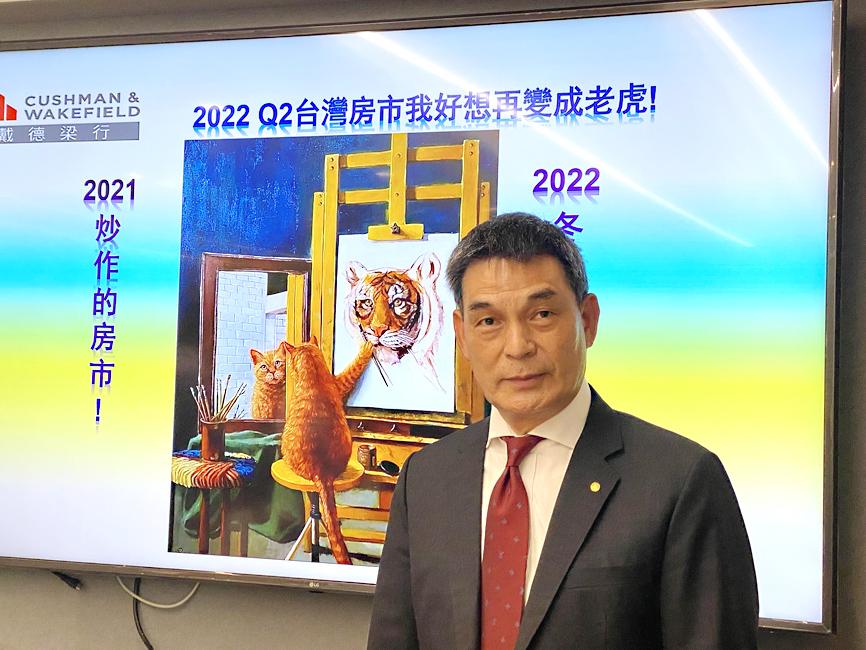Land transactions last quarter fell to a three-year low of NT$44.5 billion (US$1.55 billion), as credit controls and interest rate increases generated caution among developers, the local branch of international property consultancy Cushman & Wakefield said last week.
“This segment of the property market has sensed the chilling effect caused by waves of credit controls and the interest rate hike in March,” Cushman & Wakefield Taiwan said.
Even though the central bank last month said its policy rate increase of 25 basis points was not aimed at the property sector, the move would raise costs of land purchases and make developers wary, the consultancy said.

Photo: CNA
The chilling effect would be more evident for small and medium-sized developers, as their larger peers have deep pockets and are therefore less susceptible to rate hikes, it said.
Affluent developers would likely press ahead with land acquisition to meet development needs, but they would grow more cost-conscious, Cushman & Wakefield Taiwan said.
They would also focus on joint ventures involving urban renewal projects and development projects integrated with metropolitan railway systems given a small pool of choices, it added.
The shift in sentiment is unfavorable for land transactions for the rest of the year, and the lack of supply on the horizon would also weigh on the market, it said.
Against that backdrop, market watchers should pay close attention to upcoming sales of a 26,900 ping (88,926m2) residential plot and a 17,200 ping mixed-use plot in Taoyuan’s Jhongli District (中壢), it said.
The parcels could generate NT$13 billion in sales for tire maker Federal Corp (泰豐輪胎), the owner of the plots, the consultancy said.
Another major deal this quarter would be a 2,000 ping plot in New Taipei City’s Sanchong District (三重), it said.

TAKING STOCK: A Taiwanese cookware firm in Vietnam urged customers to assess inventory or place orders early so shipments can reach the US while tariffs are paused Taiwanese businesses in Vietnam are exploring alternatives after the White House imposed a 46 percent import duty on Vietnamese goods, following US President Donald Trump’s announcement of “reciprocal” tariffs on the US’ trading partners. Lo Shih-liang (羅世良), chairman of Brico Industry Co (裕茂工業), a Taiwanese company that manufactures cast iron cookware and stove components in Vietnam, said that more than 40 percent of his business was tied to the US market, describing the constant US policy shifts as an emotional roller coaster. “I work during the day and stay up all night watching the news. I’ve been following US news until 3am

UNCERTAINTY: Innolux activated a stringent supply chain management mechanism, as it did during the COVID-19 pandemic, to ensure optimal inventory levels for customers Flat-panel display makers AUO Corp (友達) and Innolux Corp (群創) yesterday said that about 12 to 20 percent of their display business is at risk of potential US tariffs and that they would relocate production or shipment destinations to mitigate the levies’ effects. US tariffs would have a direct impact of US$200 million on AUO’s revenue, company chairman Paul Peng (彭雙浪) told reporters on the sidelines of the Touch Taiwan trade show in Taipei yesterday. That would make up about 12 percent of the company’s overall revenue. To cope with the tariff uncertainty, AUO plans to allocate its production to manufacturing facilities in

Six years ago, LVMH’s billionaire CEO Bernard Arnault and US President Donald Trump cut the blue ribbon on a factory in rural Texas that would make designer handbags for Louis Vuitton, one of the world’s best-known luxury brands. However, since the high-profile opening, the factory has faced a host of problems limiting production, 11 former Louis Vuitton employees said. The site has consistently ranked among the worst-performing for Louis Vuitton globally, “significantly” underperforming other facilities, said three former Louis Vuitton workers and a senior industry source, who cited internal rankings shared with staff. The plant’s problems — which have not

COLLABORATION: Given Taiwan’s key position in global supply chains, the US firm is discussing strategies with local partners and clients to deal with global uncertainties Advanced Micro Devices Inc (AMD) yesterday said it is meeting with local ecosystem partners, including Taiwan Semiconductor Manufacturing Co (TSMC, 台積電), to discuss strategies, including long-term manufacturing, to navigate uncertainties such as US tariffs, as Taiwan occupies an important position in global supply chains. AMD chief executive officer Lisa Su (蘇姿丰) told reporters that Taiwan is an important part of the chip designer’s ecosystem and she is discussing with partners and customers in Taiwan to forge strong collaborations on different areas during this critical period. AMD has just become the first artificial-intelligence (AI) server chip customer of TSMC to utilize its advanced